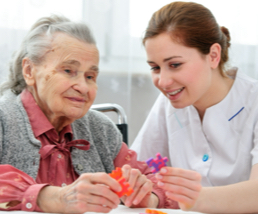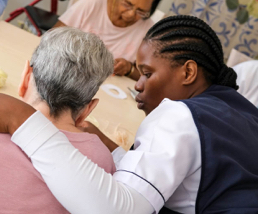
Dementia is a general term used to describe a range of symptoms. There are a number of different types of dementia, many of which have different causes and treatments. Symptoms can be subtle or severe, and tend to worsen over time. Looking after a person living with dementia can be challenging. It takes patience, understanding and compassion.
If you’re taking care of someone with dementia, there are a number of things you can do to help manage the situation.
If you’re taking care of someone with dementia, there are a number of things you can do to help manage the situation.



1. Learn more about dementia
Knowing more about dementia can help you plan for the changes that lie ahead. Dementia is defined as a syndrome, not a disease. This means that it is actually a group of symptoms that don't have a specific diagnosis. Symptoms can include everything from a reduction in memory and physical abilities to communication and cognition. It can occur due to a variety of conditions, the most common of which is Alzheimer’s disease. As dementia progresses, it can severely reduce a person’s ability to live and function on their own. In most cases, dementia isn’t reversible. But many forms can be treated depending on the root cause.
Knowing more about dementia can help you plan for the changes that lie ahead. Dementia is defined as a syndrome, not a disease. This means that it is actually a group of symptoms that don't have a specific diagnosis. Symptoms can include everything from a reduction in memory and physical abilities to communication and cognition. It can occur due to a variety of conditions, the most common of which is Alzheimer’s disease. As dementia progresses, it can severely reduce a person’s ability to live and function on their own. In most cases, dementia isn’t reversible. But many forms can be treated depending on the root cause.
2. Know the symptoms
The early symptoms of dementia can be subtle. This means they’re often overlooked at first. Forgetfulness is often the first sign, while progressive symptoms include trouble keeping track of time and losing their way in familiar surroundings. This confusion continues to increase. Personal care and daily activities become more difficult. Major signs of dementia include repetitive questioning, lack of hygiene, and decreased decision-making abilities. Over time, symptoms become more pronounced and major behaviour and personality changes can occur.
The early symptoms of dementia can be subtle. This means they’re often overlooked at first. Forgetfulness is often the first sign, while progressive symptoms include trouble keeping track of time and losing their way in familiar surroundings. This confusion continues to increase. Personal care and daily activities become more difficult. Major signs of dementia include repetitive questioning, lack of hygiene, and decreased decision-making abilities. Over time, symptoms become more pronounced and major behaviour and personality changes can occur.
3. Keep calm
People in the later stages of dementia can often be agitated and irritable. This may even develop into verbal or physical aggression. These episodes can be triggered by anything from environmental factors and fatigue to paranoia or fear of losing their independence. As a carer you can help calm the situation by reducing noise and avoiding large groups of people. It may be a good idea to turn their attention from the triggering situation by offering something to eat or a different activity. Some people with dementia may experience hallucinations or paranoia. In these instances, it’s important to remain calm and not contradict their experiences directly. Rather try to ease their concerns in a soothing manner to help lessen their anxiety.
People in the later stages of dementia can often be agitated and irritable. This may even develop into verbal or physical aggression. These episodes can be triggered by anything from environmental factors and fatigue to paranoia or fear of losing their independence. As a carer you can help calm the situation by reducing noise and avoiding large groups of people. It may be a good idea to turn their attention from the triggering situation by offering something to eat or a different activity. Some people with dementia may experience hallucinations or paranoia. In these instances, it’s important to remain calm and not contradict their experiences directly. Rather try to ease their concerns in a soothing manner to help lessen their anxiety.
4. Establish a routine
You can help the person you’re caring for feel more comfortable and confident by creating a daily routine. It can help to structure the routine into morning, afternoon and evening sections. Difficult behaviour, restlessness and confusion often increase later in the day and into the evening. So try to schedule the routine around times that suit their energy levels and particular moods. Keeping active and engaged is important, so be sure to include hobbies and light exercise that they are still able to mentally and physically manage. When it comes to daily tasks such as dressing or household chores, try to let them do as much as safely possible on their own.
You can help the person you’re caring for feel more comfortable and confident by creating a daily routine. It can help to structure the routine into morning, afternoon and evening sections. Difficult behaviour, restlessness and confusion often increase later in the day and into the evening. So try to schedule the routine around times that suit their energy levels and particular moods. Keeping active and engaged is important, so be sure to include hobbies and light exercise that they are still able to mentally and physically manage. When it comes to daily tasks such as dressing or household chores, try to let them do as much as safely possible on their own.
5. Keep communicating
Improving your communication skills will help reduce stress for the caregiver and the person with dementia. It will also help you manage difficult behaviour better. Where possible, ask simple ‘yes’ or ‘no’ questions. Keep eye contact, speak in a calm and reassuring voice, use their name, give them time to respond and listen to what they have to say. If they become upset or irritable, try changing the subject or your surroundings. Break activities into simple steps, giving simple verbal or visual cues to help them complete each task.
Improving your communication skills will help reduce stress for the caregiver and the person with dementia. It will also help you manage difficult behaviour better. Where possible, ask simple ‘yes’ or ‘no’ questions. Keep eye contact, speak in a calm and reassuring voice, use their name, give them time to respond and listen to what they have to say. If they become upset or irritable, try changing the subject or your surroundings. Break activities into simple steps, giving simple verbal or visual cues to help them complete each task.
6. Create a safe environment
People with dementia can sometimes go wandering and lose their way. This can be dangerous as they may not be aware of their surroundings and could injure themselves. Make time for regular exercise to decrease restlessness. Change locks and keep the keys in a secure place. Keep sharp items or potentially poisonous substances and medications locked away safely. Always have a fire extinguisher at hand. Close the curtains and turn on the lights before sunset to reduce shadows that may cause confusion or disorientation. Put away personal items such as a purse, coat or glasses to discourage them from leaving the house unattended. Have your relative wear an ID bracelet and keep a current photo of them in case you need to report them missing.
People with dementia can sometimes go wandering and lose their way. This can be dangerous as they may not be aware of their surroundings and could injure themselves. Make time for regular exercise to decrease restlessness. Change locks and keep the keys in a secure place. Keep sharp items or potentially poisonous substances and medications locked away safely. Always have a fire extinguisher at hand. Close the curtains and turn on the lights before sunset to reduce shadows that may cause confusion or disorientation. Put away personal items such as a purse, coat or glasses to discourage them from leaving the house unattended. Have your relative wear an ID bracelet and keep a current photo of them in case you need to report them missing.
7. Watch their diet
People with dementia may often forget to eat and drink. Certain medications and physical inabilities may also decrease their appetite. It is however essential that the person in your care follows a healthy diet. Sitting down and eating meals together may encourage them to eat and mimic your actions. Create a pleasant atmosphere by playing soft music or placing fresh flowers on the table. Turn off loud radios and the TV. Make meal and snack times part of their daily routine and schedule them at the same time every day.
People with dementia may often forget to eat and drink. Certain medications and physical inabilities may also decrease their appetite. It is however essential that the person in your care follows a healthy diet. Sitting down and eating meals together may encourage them to eat and mimic your actions. Create a pleasant atmosphere by playing soft music or placing fresh flowers on the table. Turn off loud radios and the TV. Make meal and snack times part of their daily routine and schedule them at the same time every day.
8. Support and assisted living for people with Dementia
You might reach a stage where it is becoming increasingly difficult to take care of a loved one with Dementia and you might need to consider moving them to a care facility that can take care of them. We are fully equipped to provide the professional care, facilities and support dementia patients need to stay safe, healthy and comfortable. We currently manage seven retirement villages across South Africa with assisted living and frail care units. Our residents are looked after by our national nursing services manager, nursing services manager, sisters, nurses and care workers. Residents also have access to a doctor, occupational therapist and support services. Our team will assess the needs of each resident to ensure they get the exact level of care they need throughout every stage of their life with dementia.
You might reach a stage where it is becoming increasingly difficult to take care of a loved one with Dementia and you might need to consider moving them to a care facility that can take care of them. We are fully equipped to provide the professional care, facilities and support dementia patients need to stay safe, healthy and comfortable. We currently manage seven retirement villages across South Africa with assisted living and frail care units. Our residents are looked after by our national nursing services manager, nursing services manager, sisters, nurses and care workers. Residents also have access to a doctor, occupational therapist and support services. Our team will assess the needs of each resident to ensure they get the exact level of care they need throughout every stage of their life with dementia.
To find out more about us, you can head over to our homepage for more information.
Dementia can drastically reduce a person’s ability to take care of themselves over time. By learning more about the signs and symptoms of dementia, as well as gaining some practical advice and guidelines, you can manage their needs with greater efficiency and confidence. Read on for insights and advice on the best ways to care for someone with dementia.
